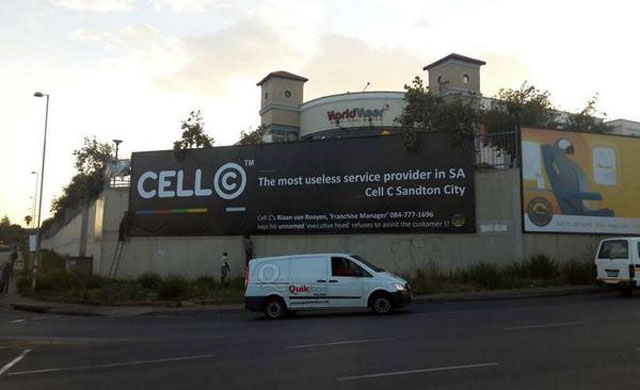
Cell C’s urgent application to take down a banner referring to them as “the most useless service provider in SA” was about revenge, the high court in Johannesburg heard on Wednesday.
“What this is about is revenge and reprisal,” Shem Symon, for George Prokas, the man responsible for the banner, told the court.
“We have a first respondent [Prokas] here who is a consumer advocate. He insists on his right to be heard.”
Replying to Cell C’s submission before judge Sharise Weiner, Symon said Prokas tried to resolve his complaint with the company over an extended period of time prior to the banner being put up.
The banner was put up at the WorldWear Mall on Beyers Naude Drive on 6 November.
Appearing professionally printed and bearing the Cell C logo, it was prominently displayed at the mall along the road. “The most useless service provider in SA — Cell C Sandton City,” it read.
It gave the name of the franchise manager and his phone number, claiming he had said that his “unnamed executive head refuses to assist the customer”.
The dispute arose from a phone Prokas had taken up for his son with Cell C in 2013. The phone’s indicated number turned out to belong to and was being used by a different person.
That individual ran up a bill of R5 000, by which time Prokas ended the stop order for the phone in October last year.
However, when attempting to buy a car earlier in 2014, Prokas discovered he was listed as a bad debtor as a result of the unpaid R5 000.
He sought to have the bill waived by Cell C and removed from the bad debtors list by the end of October this year.
However, by the end of October the situation had not changed, with Prokas having exchanged e-mails with Cell C, indicating he would put the banner up unless his complaints were dealt with.
After his complaints were allegedly not dealt with, Prokas put the banner up.
The banner had been changed over this weekend, which Prokas had indicated he was not involved in, and now read “Cell C the most useful cellular provider”, with the logo altered.
It was not known who altered the banner.
Symon questioned how the cellphone provider could ask for an interim interdict for something that had already happened. “I don’t really understand, after it has already happened and after it has gone viral,” he said.
The reaction to the banner on social media, following the appearance of pictures of the original banner, was consumers showing their dissatisfaction with poor service.
“This is a … reaction in the modern day electronic media environment of consumers saying no,” Symon said.
At one point in submissions, judge Weiner remarked: “I wonder who is wishing they had written off the R5 000.”
Earlier, Christopher Whittcutt, for Cell C, told the court the banner was defamatory to the point of unlawfulness.
“As it stands, it continues to be unlawful and it is that unlawfulness the applicant seeks to interdict,” he said.
Whittcutt said, paraphrasing Prokas’s communication with the company, that Prokas would stop defaming the company if they waived the bill and paid him money.
It had cost Prokas R61 200 to make and put the banner up, which he sought payment for from Cell C, Whittcutt said. “This is blackmail, as defined in the Oxford English dictionary.”
Symon, when making his submission, strongly disagreed with Whittcutt’s assertion that Prokas had sought to blackmail the company.
Whittcutt said the franchise manager whose number was on the banner had received a “deluge” of messages following it being put up, violating his right to privacy.
Weiner was expected to rule on the matter on Thursday afternoon. — Sapa




